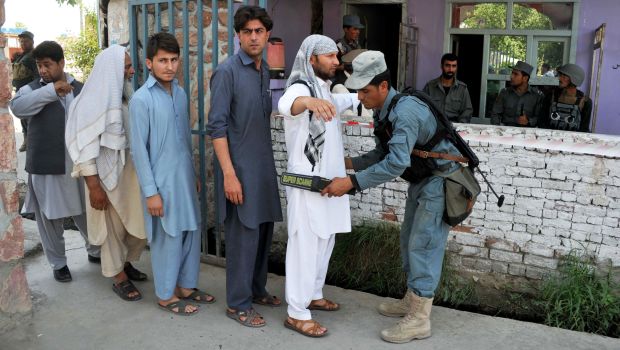
Afghan police search residents waiting to cast their ballots as they enter a polling station in Jalalabad on June 14, 2014. (AFP PHOTO/Noorullah Shirzada)
Kabul, AP—Amid tight security, Afghans lined up Saturday to vote in a presidential runoff between two candidates who both promise to improve ties with the West and combat corruption as they confront a powerful Taliban insurgency and preside over the withdrawal of most foreign troops by the end of the year.
Whoever wins faces major challenges in trying to bolster Afghanistan’s security forces against a relentless insurgency and improving the nation’s economy and infrastructure at a time when international aid for Afghanistan is drying up.
The presidential hopefuls—former foreign minister Abdullah Abdullah and ex-World Bank official and former finance minister Ashraf Ghani—differ more in personality than in policy. Both have promised to sign a long-delayed security pact with the United States. That would allow nearly 10,000 American troops to remain in the country for two more years to conduct counterterrorism operations and continue training and advising the ill-prepared Afghan army and police.
President Hamid Karzai, who has grown increasingly alienated from his one-time US allies during his two terms in office, has refused to sign the pact.
Many voters said they were eager to get the bilateral security agreement signed after watching Islamic extremists seize large sections of Iraq nearly three years after US troops withdrew from the country. Iraq’s Shi’ite-led government had discussed with the Americans the possibility of a residual US force but the two sides were unable to reach an agreement.
“Iraq is burning,” Abbas Razaye, a 36-year-old shopkeeper, said after voting in a mosque in western Kabul. “We need the foreign troops for the time being. Otherwise our history of civil war will repeat itself and Afghanistan will deteriorate even more than Iraq.” He cast his ballot for Ghani, saying “he’s the right person to bring peace and security to Afghanistan.”
Abdullah and Ghani were facing off after none of the eight candidates in the first round won the majority needed to avoid a second round. Abdullah emerged as the front-runner after he garnered 45 percent of votes in the initial balloting; Ghani was second with 31.6 percent. The two have since campaigned as much for the support from their six former rivals as from Afghans themselves.
Abdul Hakim, a 25-year-old businessman, said he voted for Abdullah in both elections, and he has high expectations.
“I want Abdullah to remove corruption and poppy cultivation and bring security. He should definitely sign the BSA,” he said. “Afghanistan has no economy. Afghanistan has very bad security.”
The Taliban have intensified attacks ahead of the vote and warned people to stay away from the polls, but only minor violence was reported by midday. Security forces frisked voters before allowing them into polling stations and erecting new checkpoints around the city to search cars for explosives or other weapons.
Polls were due to close at 4:00 pm local time although there was a possibility they could be kept open if turnout was high. Official preliminary results to be announced on July 2, final on July 22.
A bomb hidden in a trash can exploded about an hour before polls opened in a western district of Kabul, and a rocket struck elsewhere, but there were no casualties, officials said. Another bomb exploded near a polling station on the outskirts of Kabul.
Karzai, who has led the country since the US invasion toppled the Taliban in the months after the September 11, 2001 attacks, but was constitutionally barred from seeking a third term, cast his ballot at a high school near the presidential palace.
“Today your vote will lead Afghanistan toward a better future, better government and a better life,” he said to his countrymen. “Afghanistan is taking another step forward in a transition toward security, progress and stability.”
Abdullah, 53, whose mother was a Tajik, draws his support mainly from that ethnicity although his father was Pashtun. During the Soviet occupation of Afghanistan, he served as adviser to and spokesman for Tajik warlord Ahmad Shah Massoud, who was assassinated by Al-Qaeda two days before the September 11 attacks. Later that year, Abdullah became the face of Afghanistan’s anti-Taliban movement after the US toppled the Taliban regime, giving frequent press conferences to international media. He served as foreign minister and then was the runner-up in Karzai’s disputed re-election in 2009.
Ghani, a 64-year-old Pashtun, received a PhD in anthropology from Columbia University, taught at Johns Hopkins University and worked at the World Bank. He gave up US citizenship to run in the 2009 election, but received only 3 percent of the vote. With Karzai constitutionally barred from a third term, Ghani has gained the support of many Pashtuns who voted against him five years ago.
Sayed Qayyum, 58, who waited in line to cast his ballot in a high school in the capital Kabul said he hoped the agreement would be signed. “I want the [pact] to be signed because I have concerns about future security,” he said. “I am afraid if it isn’t signed then Afghanistan will face the same fate as Iraq.”
